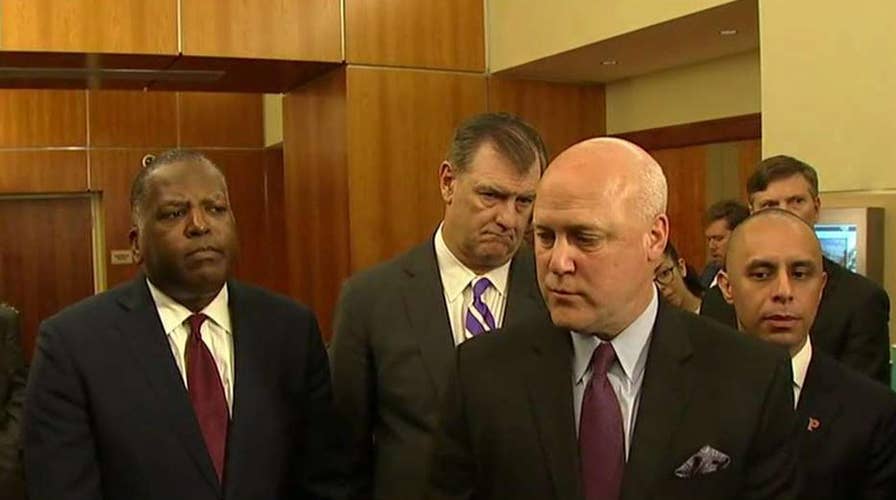Mayors meet with DHS chief amid sanctuary city outrage
The department reassured mayors that the feds do not intend a broad sweep of illegal immigrants; Doug McKelway reports on 'Special Report'
WASHINGTON – Emerging from a meeting with Department of Homeland Security Secretary John Kelly Wednesday on the Trump Administration's plan to withhold federal grants to sanctuary jurisdictions, Los Angeles Mayor Eric Garcetti struck an optimistic tone: "What we're trying to find is common ground," he told reporters.
The policy, unveiled Monday at the White House by Attorney General Jeff Sessions, could hit sanctuary jurisdictions where it most hurts, by cutting off federal money for law enforcement equipment, victims' services, lab technology and more.
"We are opposed to any funding being taken away as a punitive measure," Montgomery County (Md.) Police Chief Tom Manger said.
But underlying local leaders' concerns is confusion about what constitutes a "sanctuary" jurisdiction or program.
The Center for Immigration Studies defines it as "a policy that is non-cooperative and obstructs immigration enforcement." The Center says 306 jurisdictions across the U.S. meet that definition, including Rockville, Md., where the city manager this week denied it offers sanctuary.
"A misperception has been circulated questioning whether Rockville complies with federal law. Absolutely we do," Robert Dispirito told citizens in a packed city council session.
Los Angeles is another city often cited as a sanctuary. "Nothing could be further from the truth," Garcetti told Fox News, "We work every single day with ICE and other folks to make sure with a judicial warrant that comes from a court with a probable cause suspicion that people are all the time given over and deported."
Stephen K. Benjamin, the mayor of Columbia, S.C., also defended big cities who do not check immigration status of residents during routine traffic stops or other minor infractions.
"We are not sanctuary cities. We are American cities. These threats of holding back funding from cities across America, these are taxpayer dollars," he said.
Austin, Texas Mayor Steve Adler explained the apparent parsing of the definition of sanctuary, and the legal standard that many local authorities use that markedly contrasts with the federal standard under the Trump Administration. "To be clear, somebody that is in this country undocumented has committed a civil violation. Not a criminal violation but a civil violation," he said.
Trump Administration officials believe that different standard has helped lead to the proliferation of illegal border crossings and what critics say is an increase in crime, lower public school educational standards and higher property tax increases to fund multi-lingual instructors and separate programs for non-English speaking students in public schools.
Texas Gov. Greg Abbott is not waiting for the Trump Administration policy to come to fruition. He has targeted Austin and surrounding Travis County, which he calls a sanctuary jurisdiction, by holding back state money.
He recently told Fox News, "I withdrew $1.5 million of funding from the governor's office to Travis County. On top of that, what the state of Texas is seeking to do is to make it so punishing for cities and counties that they simply cannot have sanctuary cities. What that includes is fines that could add up to about $9 million a year."
If any common ground were reached Wednesday, it was DHS's reassurance to mayors that the feds do not intend a broad sweep of illegals.
"We do not conduct sweeps. We do not conduct raids. We are looking for specific people," DHS spokesman David Lapan told Fox News.
DHS Secretary Kelly left Wednesday's closed door meeting without commenting, but Lapan also said DHS has not made any decisions on withholding funding until a clearer definition of sanctuary is reached. He added there is no timetable for that decision.


